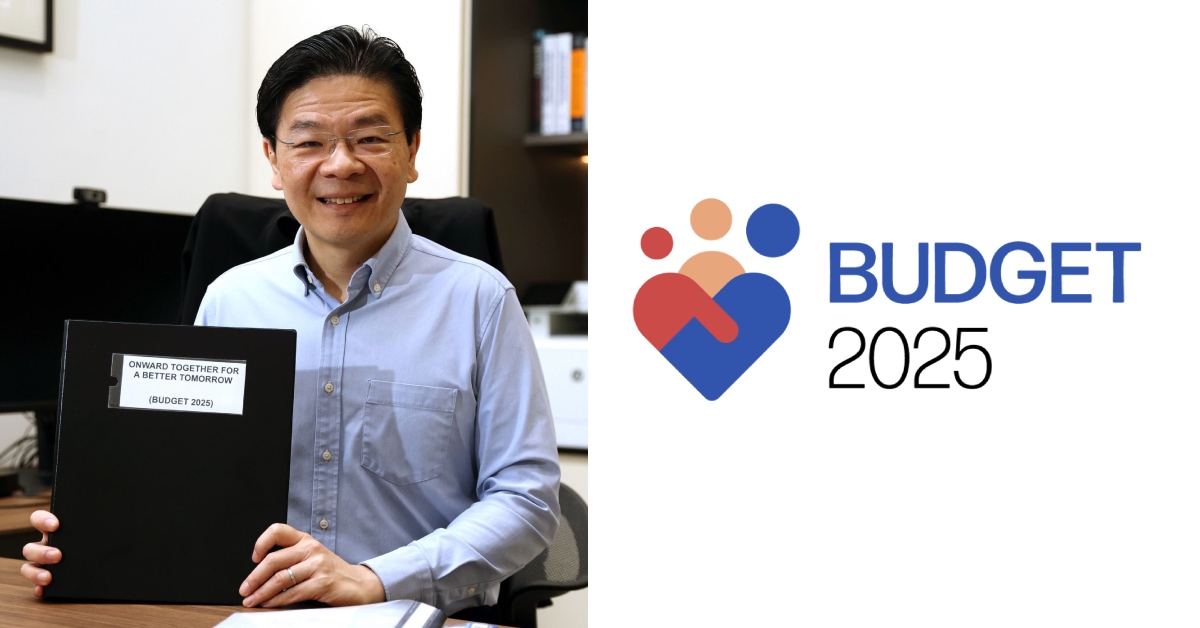
Prime Minister and Minister of Finance Lawrence Wong has delivered Singapore’s Budget 2025 statement today (February 18).
Titled Onward Together For A Better Tomorrow, this year’s Budget includes more support for cost of living concerns, seniors and workers, among other initiatives.
We’ve simplified the announcement and have broken down the key benefits for different groups of Singaporeans and businesses. Here’s what you need to know about the major announcements:
For individuals
S$600 vouchers will be given to all Singaporeans aged 21 to 59 in commemoration of SG60. S$800 vouchers will also be given to those aged 60 and above.
There will be a personal income tax rebate of 60% for YA 2025, capped at S$200.
SG Culture pass valued at S$100 credits will be given to all Singaporeans aged 18 and above and will be available from September 2025 to the end of 2028.
For households and families
Each Singaporean household will receive S$800 in Community Development Council vouchers, and additional U-Save rebates of up to S$750 this financial year.
S$500 LifeSG credits will be given out for each Singaporean child aged 12 and below, similar to the NS LifeSG credits handed out last year. The credits can be used for groceries, utilities and pharmacy items.
The government will also provide a S$500 Edusave or Post-Secondary Education Account top-up for every Singaporean aged 13 to 20 this year.
ComCare Assistance Scheme payouts will be increased to better support those in need—for instance, a one-person household on long-term assistance will receive an additional S$120 per month, bringing the total monthly payout to S$760.
The government will ramp up Singapore’s BTO supply in the coming years—more than 50,000 new HBD flats will be built in the next three years.
Climate vouchers will be enhanced—HDB households will get an additional S$100 worth of climate vouchers, making it S$400 in total, while those residing in private properties will receive these vouchers soon as well.
For seniors
Singapore Allowance will increase from S$350 to S$390 each month. The monthly pension ceiling will also increase to S$1,320.
The Enhancement for Active Seniors (EASE) programme, currently limited to HDB residents, will be expanded for three years to 2028 for households in private properties.
A new five-year Matched MediSave Scheme will be introduced, and this will apply to eligible lower-income seniors aged 55 to 70.
For seniors with more severe care needs and who require nursing homes, subsidies will increase by 15%, and the maximum qualifying per capita household income will also be raised to S$4,800.
Those born in 1969 or before and do not benefit from CareShield Life will have their subsidies increased by 5%.
Support will be enhanced for seniors who don’t stay in nursing homes—existing subsidies for long-term care services in the home and community will go up by 10%, and subsidies under the Seniors’ Mobility and Enabling Fund will also increase.
The Home Caregiving Grant will also increase from S$400 a month to S$600.
For workers
The training allowance under the SkillsFuture Level Up Programme, targeted at Singaporeans aged 40 and above, will be extended to part-time training from early next year.
An enhanced tier of support under the Workfare Skills Support will be introduced, which will be modelled after the SkillsFuture Level-Up Programme and benefit lower-wage workers when they turn 30.
A new SkillsFuture Workforce Development Grant will also be introduced, which will provide higher funding support of up to 70% for job redesign activities.
Senior workers will see increased CPF contribution rates, and those aged between 55 to 65 years old will see their contribution rates increase by 1.5% in 2026.
The government has extended the Uplifting Employment Credit to end-2028 to give ex-offenders employment opportunities.
For SMEs & businesses
A 50% corporate income tax rebate will be introduced in YA 2025.
The government’s co-funding levels for wage increases under the Progressive Wage Credit Scheme will be increased from 30 per cent in 2025 to 40 per cent and from 15 per cent in 2026 to 20 per cent.
The National Productivity Fund will be topped up with an additional S$3 billion to support measures for businesses to improve productivity, and continue to educate and train workers.
EDB will launch a Global Founder Programme later this year to tap the agency’s close links with multinational firms and entrepreneurs and help Singapore-based enterprises to scale up.
Up to S$150 million will be put aside for a new Enterprise Compute Initiative which will help firms tailor AI solutions to their needs and integrate them into their business processes and systems.
A new S$1 billion Private Credit Growth Fund will also be introduced to provide more financing options for high-growth local enterprises.
Tax incentives will be introduced for Singapore-based companies and fund managers that choose to list in Singapore and grow their economic activities here.
A redesigned SkillsFuture Enterprise Credit will be introduced—all companies with at least three resident employees will get a fresh S$10,000 in the redesigned SkillsFuture Enterprise credit.
S$200 million will be pumped into NTUC’s Company Training Committee grant to help more companies transform.
The extension of the Senior Employment Credit (SEC) and the Uplifting Employment Credit will provide wage offsets for employers who hire Singaporean seniors and ex-offenders.
The CPF Transition Offset will be extended to employers for another year to cover half of the increase in employer contributions for 2026.
- Read other articles we’ve written on Budget 2025 Singapore here.
Featured Image Credit: PM Lawerence Wong via Facebook/ Ministry of Finance

